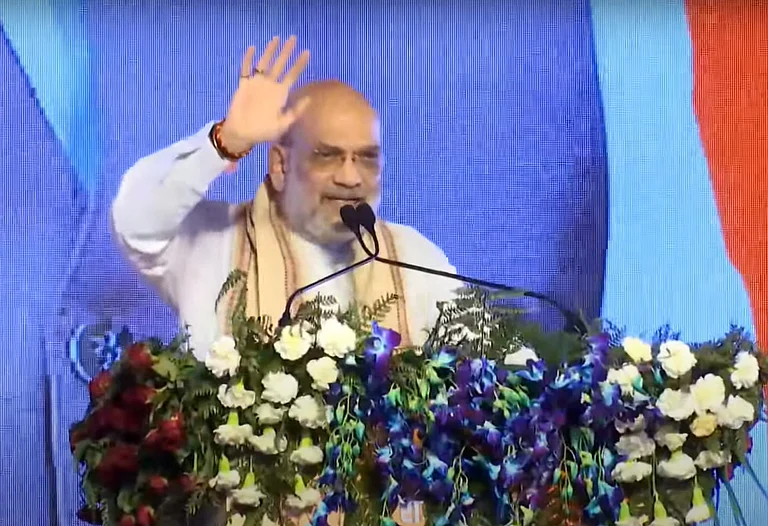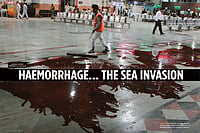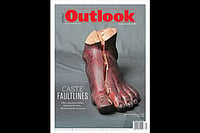Looking back, I can see that something powerful occurred in that moment, and it still astonishes me all these years later: Bashir Ahmed understood in about five minutes what took my father decades. And me? What did I understand back then? Nothing, except that when my mother laughed like that, it made me want a million things at once. I wanted to run until I dropped; I wanted to roll on the ground; I wanted to climb into her lap and stay there forever.
“Where do you live?” she asked him.
“Me? I have a room near Russell Market.”
“No, I meant originally. In Kashmir. That’s where you’re from, isn’t it?”
“Oh, a small village. In the mountains. You wouldn’t have heard of it.” He grinned wickedly. “You people in India, you think Kashmir begins and ends with Srinagar.”
“Is it beautiful there?” “In my village? Why don’t you come and see for yourself? Oh, but I forget,” and he pointed mischievously to his green eyes, “you’re a little blind. How sad. Actually, it’s probably better if you don’t come. You will look at the Himalayas and say, ‘But where are the mountains?’”
“Maybe I will come,” my mother declared, shaking her finger at him. “One of these days, you’ll open the door and I’ll be standing there. Then what will you do, Mr. Bashir Ahmed?”
“I will ask, ‘Do you want tea or coffee, madam, or are you on a diet?’” They laughed. I found that I was also grinning, though I didn’t fully grasp the joke. All I knew was that there was a lovely hysteria in the air, and I wanted to inhale it deep, deep into my lungs. The fog that had obscured my mother for days suddenly seemed thinner. I could see her more clearly, hear the clarity and confidence in her voice.
“And what about you, beti?” Bashir Ahmed turned to me, smiling. “Are you coming too?”
“Yes,” I answered promptly. “I am.”
“Good!” he said, slapping his thigh with a large palm. “My son will enjoy meeting you.”
At that, my mother’s smile flickered. He noticed it right away and his own mouth became a tight line. In the few seconds of silence that followed, I heard the loud ticking of the clock on top of the TV. I looked from one to the other. Then Bashir Ahmed cleared his throat.
“Beti,” he said quickly, “would you like to hear a story?”
I glanced at my mother, but she was unreachable now, offering no clue. It was the single most devastating habit she had, to withdraw, to take back the thrilling gift of her joy as casually as she bestowed it. I’d always believed that I was the only one in the world who saw it as clearly as I did, her lightning switch from one self to another. But one look at this stranger’s face told me he understood it, too, and it gave me an odd and unexpected comfort.
“Yes,” I said. “I would.”
“All right,” Bashir Ahmed said, nodding. “Then listen.” His chin dropped so low it nearly touched his chest, and he took several deep breaths. His eyelids fluttered almost closed. His hands came to rest in his lap. Over the years, I would become familiar with his tactics: the long pause at the beginning, the swift rise of his deep voice followed by the precipitous drop, his trick of repeating innocuous phrases until they turned ominous. “In Kashmir, a long time ago,” he said, “there lived an old man. Because he had come from the city of Baghdad, in Iraq, people called him Shah Baghdadi. This old man, he was a pir. Do you know what that is, beti? A pir?”
I shook my head.
“A wise man,” Bashir Ahmed said solemnly. “This Shah Baghdadi had read many books, and he knew a lot about the world. He could even perform magic. People who were sick would go to him, and he would heal them. But he was very careful with his powers, you see, because he knew that they were gifts from Allah.”
From the corner of my eye, I could see my mother’s head turn slightly.
“Now what I forgot to tell you, beti,” Bashir Ahmed went on slowly, “was that Shah Baghdadi had a son. A son,” he said again, and I felt a chill run up my arms. “A son who was born when Shah Baghdadi was already old, and whose mother had died. His father loved him very much, but from the beginning, the boy only knew how to break his heart. And, to make things worse, it became clear that he also had his father’s powers. Shah Baghdadi tried to make him study, begged his son to understand that such powers should not be taken lightly, but the boy did not listen. When he was ten years old, he asked for a horse. Shah Baghdadi refused, so the boy became angry. He jumped up onto a wall, turned the wall into a beautiful black horse, and rode away.”
My mother was listening, leaning forward now, but Bashir Ahmed’s eyes did not so much as flicker in her direction. He spoke to me, as though everyone but the two of us had ceased to exist.
*Excerpted from Madhuri Vijay’s The Far Field with permission from HarperCollins India*


























